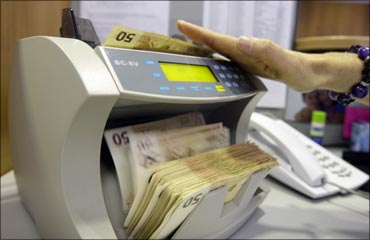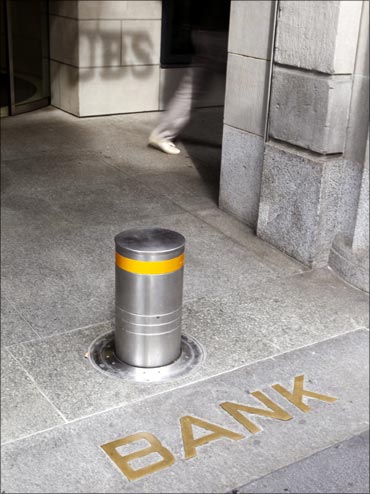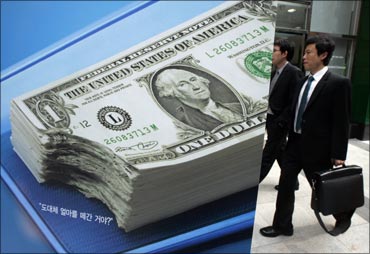 | « Back to article | Print this article |
Bring back black money, end tax havens. But how?
As the anti-corruption mobilisation intensifies most of the attention is on government-related scams. Predictably, Baba Ramdev's confrontation with the government has openly become a tussle between the Congress party and the Bharatiya Janata Party/Rashtriya Swayamsevak Sangh.
It is easy enough to say that India's stolen wealth, stashed in foreign bank accounts, should be brought back. But how?
Baba Ramdev has demanded that there be stringent punishment of and surveillance on those visiting tax havens abroad. It so happens that the means to monitor global financial flows are slowly improving, but there is a long way to go before there is adequate transparency.
A heightened public outrage about black money stashed abroad is only potentially a good thing. Effective and meaningful change will only come from sustained campaigns for changes that will make it harder to hide money in tax havens.
Click NEXT to read on . . .
Bring back black money, end tax havens. But how?
This might be a good time to re-visit the work of the Tax Justice Network and related international forums, which was reported in this column some months ago.
While much of the public outcry in India, at present, is focussed on money siphoned off by politicians through big-ticket scams, the view in the international activist networks is somewhat different.
In these circles it is estimated that approximately $462 billion of Indian assets are illicitly held abroad. And these are largely attributed to tax evasion by that India's wealthy.
However, the focus of a recent End Tax Haven Secrecy campaign in Europe is not merely tax evasion by wealthy individuals but also by corporations.
Click NEXT to read on . . .
Bring back black money, end tax havens. But how?
This campaign is demanding that all G20 nations introduce measures to end the secrecy of tax havens which enables companies to hide their profits and avoid paying taxes in developing countries.
The purpose of this campaign is to ensure that companies not only report on the profits made and taxes paid in every country where they operate but that this information is automatically exchanged across different tax jurisdictions.
This measure is expected to help developing countries collect the taxes they are owed.
According to this campaign's web site, tax dodging by multinational companies costs developing countries over a hundred billion dollars every year -- more than the entire global aid budget.
Click NEXT to read on . . .
Bring back black money, end tax havens. But how?
This is a staggering figure by any measure but more so when financial instability is causing many countries to make severe cuts in social spending.
Tax Information Exchange Agreements between countries are one way to prevent, or at least curb, the flow of illicit funds.
By February this year, India had signed Tax Information Exchange Agreements (TIEA) with 13 countries, including Bahamas, Bermuda, Cayman Islands and British Virgin Islands.
After the G-20 meeting in France in February Finance Minister Pranab Mukherjee was reported as saying that India is negotiating with other countries to prevent black money from being stashed in foreign banks.
Click NEXT to read on . . .
Bring back black money, end tax havens. But how?
India signed a revised Double Taxation Avoidance Agreement (DTAA) with Switzerland in August 2010. A TIEA with the Swiss is pending approval by the Swiss parliament and could be in force by January 2012.
So there is some movement towards change. But pressure from public protests may not be sufficient to accelerate change. This will require sustained and organised effort by groups and individuals to push for still stronger regulations and better implementation.
However, the onus does not rest entirely on governments. Businesses are major offenders. According to the Tax Justice Network, an international coalition of non-profit organisations, it is estimated that 60 per cent of all global trade is routed through tax havens.
This partly happens through re-invoicing, a form of trade mispricing.
Click NEXT to read on . . .
Bring back black money, end tax havens. But how?
A report by Global Financial Integrity, a Washington based organisation, says that goods leave a country under one invoice, then the invoice is re-directed to a tax haven where the price is altered, then the revised invoice is sent to the importing country for the purposes of clearing and payment.
According to Raymond Baker of Global Financial Integrity, 'Thousands of companies provide helpful mispricing services to tens of thousands of their overseas customers in hundreds of thousands of transactions moving billions of dollars into Western accounts.'
The premise of the Tax Justice Network is that high income countries have an opportunity -- and even an obligation -- to change the conditions and mechanisms which facilitate these illicit financial flows and severely hinder development.
In 2008, a report by Christian Aid estimated that estimated that developing countries lose $160 billion per year from transfer mispricing and false invoicing.
Click NEXT to read on . . .
Bring back black money, end tax havens. But how?
Such false invoicing is not merely the work of corporations. It is commonly practiced by smaller businesses and considered quite 'normal'.
So pressure on government to prosecute politicians who have stolen public funds through scams is vital.
But someone like Baba Ramdev might have more impact if he could persuade his vast constituency, which also consists of business people, to desist from practices which give rise to black money.






